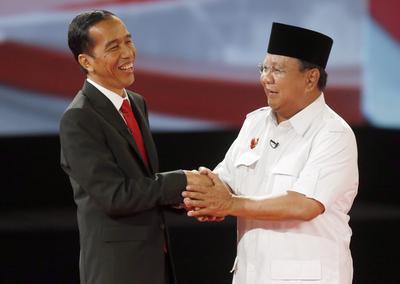This was based on the now-established Indonesian practice of accurate exit poll surveys and quick counts conducted by the country’s increasingly sophisticated polling industry. These gave Jokowi a 4–5 per cent margin over his rival, Prabowo Subianto.
So, Jokowi claimed victory.
But less than an hour later, Prabowo also claimed victory, based on the reported findings of other polling groups. The picture quickly became even more clouded as commentators pointed out that the polling groups reporting in Prabowo’s favour did not have credible track records and were controlled by or associated with Prabowo and his key supporters. Polling day in Indonesia ended with the incumbent president, Susilo Bambang Yudhoyono, calling for calm and restraint while the Election Commission conducted its counting of the actual voting returns.
Indonesia now faces a tense waiting period. Prior to the poll, the Election Commission indicated that it would declare the result by 22 July. Notwithstanding calls for calm and restraint, it is likely that both candidates will continue to advance their claims. Counting in Jokowi’s favour is the fact that, overwhelmingly, the independent and reputed polling bodies have confidently declared him the winner.
Still, in Prabowo’s favour is the fact that at least some polling bodies have declared him the winner and, more importantly, the dominant television and online media groups — unambiguously in his camp — will in all likelihood vigorously amplify his claim over the coming days.
The Election Commission — itself not a stranger to controversy — will now come under intense pressure. It is also possible that whatever conclusion the Election Commission comes to, the result may be subject to legal challenge in the country’s Constitutional Court. A confidence-sapping and possibly prolonged period of uncertainty is quite conceivable.
The country and the world are thus left contemplating the two candidates and what their presidencies would likely entail. Jokowi has been widely viewed as a pragmatic man of the people, representing a new breed of post-Suharto politicians. By contrast, Prabowo has often been seen as a muscular leader capable of cutting through normal political machinations and appealing to visions of national pride and strength.
Jokowi seems to have resonated strongly with female voters and older voters, while Prabowo has found support among younger male voters. Prabowo has attracted strong support from Muslim groups and generates fears among minorities, particularly Christian and Chinese Indonesians. Jokowi has attracted the support of international investors and the international media.
As president, either candidate would likely reflect and play to the tide of nationalist sentiment that has been rising over the past couple of years. (Interestingly, this nationalist turn in politics parallels comparable shifts in national leadership elsewhere in the region, including in China, India, Japan and South Korea.) Accordingly, as president, neither candidate would be likely to introduce strongly market-strengthening reforms. And, regardless, either candidate would face the vexing challenge of passing legislation in a multi-party coalition environment.
Hopes for a Jokowi presidency centre on a further deepening of democracy that places renewed emphasis on fighting corruption and protecting minority rights, while still achieving tolerably effective governance. Hopes for a Prabowo presidency centre on a decisive drive towards national renewal and socio-economic strengthening, without an excessive expansion of presidential power.
On the other hand, fears of a Jokowi presidency largely turn on the prospect of an otherwise promising administration being hamstrung by party politics. The analogy to the dysfunctions of the Manmohan Singh/Sonia Gandhi diarchy, though imperfect, is strongly suggestive. In the case of Prabowo, the fear is that he will bridle at institutional constraints on executive power and degrade or even overturn Indonesian democracy.
Indonesia’s thus far impressive fledgling democracy now seems likely to face an even keener test of its strength than any had anticipated. The closeness of the apparent margin of victory and the confusion created by the conflicting claims on exit polling and quick count data open the door to deeply problematic possibilities.
Unless clear evidence of major electoral irregularity comes to light, I see no grounds for doubting the projections of the polling groups with established track records — which should yield a Jokowi presidency. But this result will now require the Election Commission and perhaps the Constitutional Court to withstand potentially acute extra-constitutional pressures.
Indonesians have played their part, but how will the country’s adjudicative institutions play theirs? My expectation — based on the evidence available at the time of writing — is that they will prove up to the task. If so, this election will have constituted a bigger step forward in the country’s political evolution than any could have guessed.
Andrew MacIntyre is Deputy Vice-Chancellor International & Vice-President, RMIT University.


One hurdle for Jokowi, assuming for the sake of argument that he is declared the elected president, is that he doesn’t have a parliamentary majority. Prabowo does. His supporters in parliament have already forced through a bill which, among other things, robs the party that topped the parliamentary poll, (Jokowi’s PDI-P, in this instance), of the automatic right to obtain the parliamentary speakership, a very strategic post.
Lacking a majority right now would not be a problem if Jokowi was prepared to offer cabinet posts to politicians from some of the parties that have so far backed Prabowo. They would be sure to jump ship. But, for commendable reasons, he doesn’t want to do this. He doesn’t want to engage in what he calls ‘transactional politics’.
One hopes Jokowi will prevail, but it is hard to see how parties like Golkar, or indeed Yudhoyono’s own Democrat Party, would choose to support a Jokowi administration if the traditional rewards were not offered them.
But it is also hard to see how a minority government would work.